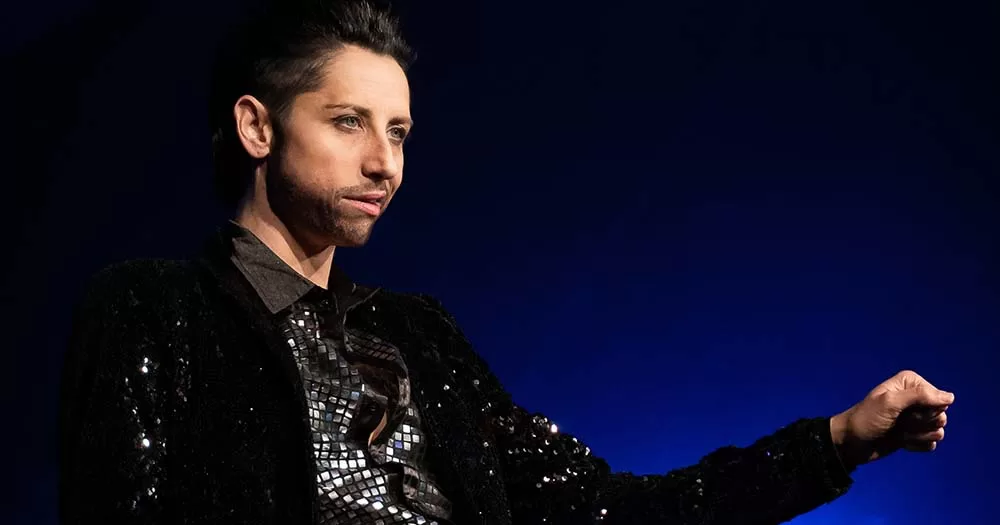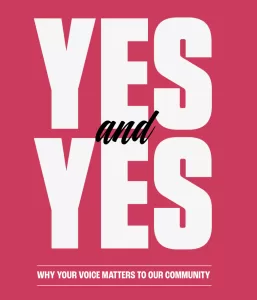When most people hear the word “drag ”, one idea immediately comes to mind: a hyper-glamorous drag queen sashaying across a stage with a huge wig and a tuck, but drag kings are an important genre of this incredibly artistic and gender-bending world.
The term “drag king” was first cited in print in 1972, but the history of female performers playing with masculine identities and masquerading in men’s attire dates back centuries.
In China, during the Tang Dynasty, women portrayed men in opera stage performances from 618- 907 AD. This practice was revived in the west in the late 19th century when drag kings including Annie Hindle, Vesta Tilley, and Ella Wesner began performing in the US and the UK.
Drag and cross-dressing were criminalised in the 1900’s, but Black jazz icon Gladys Bentley bravely wore tuxedos and sang about her relationships with women in the US in the 1920’s and 1930’s, while Stormé DeLarverié performed as a drag king and even played a key role in the 1969 New York Stonewall Riots.
Today, drag kings are powerful performers who can transform masculinity into something that is both beautiful and satirical, but outside of queer communities, this style of performance is largely uncelebrated.
For Brigid’s weekend this February, Dublin projected an exhibition by Deirdre Brennan of ‘Modern Day Brigits’ in the city centre. In the midst of images of young girls and gorgeously aged older women was a male-presenting performer donned in a moustache, lipstick, and top hat.
While some observers didn’t even realise they were admiring someone in drag, others immediately recognised Victor Victoria, one of Ireland’s drag kings.
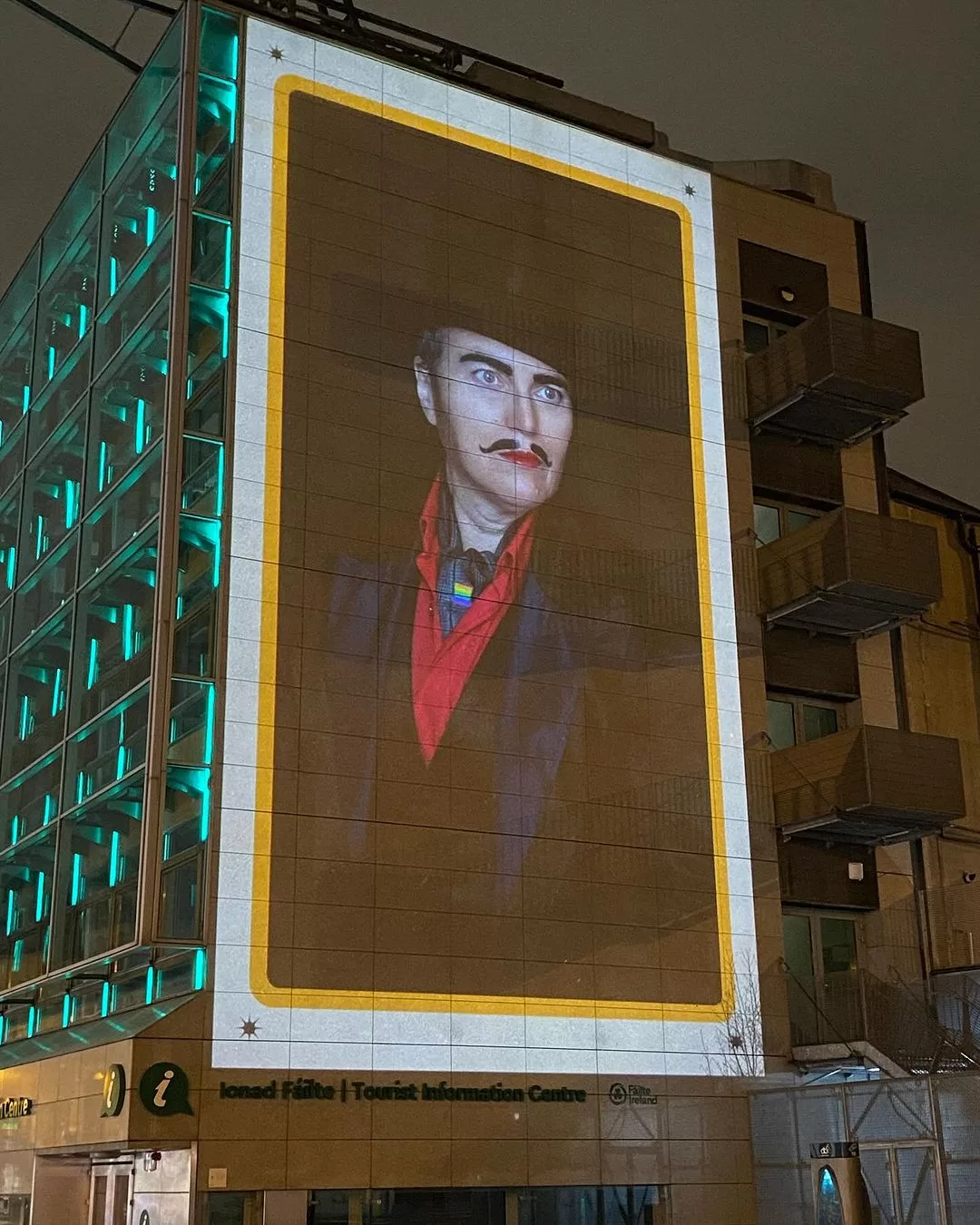
Ireland has a thriving drag king community. Drag king performances predominantly attract queer women and non-binary audiences, and the shows are typically advertised by word of mouth.
Jezebel Jocks are a drag king Troupe based in Galway founded by original members Victor Victoria, Ulick Ní Clitterbug, and Buttocks, and the Irish Drag King Collective is Ireland’s digital drag king community made up of drag king+ performers from across the country.
Each performer brings their own persona, style and flare to uniquely embody their drag identities, and I was lucky enough to talk with three of Ireland’s incredibly talented kings about their drag identities, what they love about performing, and the public’s evolving perception of drag kings.
Breege (she/her) describes her drag identity Victor Victoria (they/them) as an elegant character who parodies masculinity by carrying both masculine and feminine qualities in a way that is charming, seductive, and satirical.
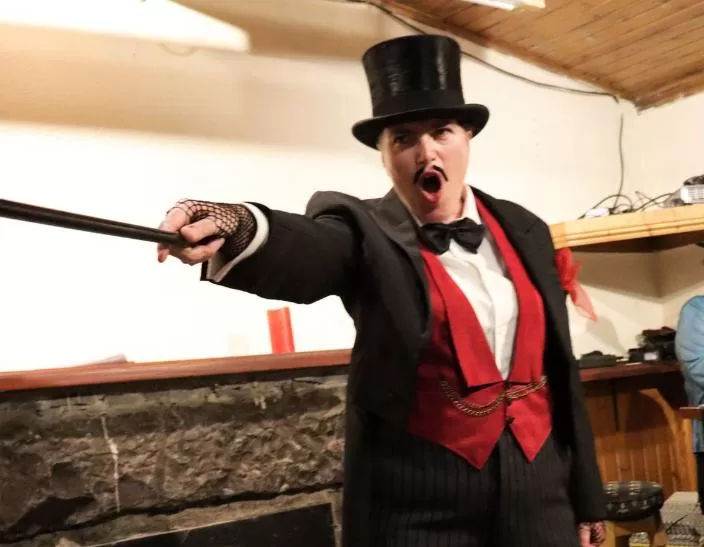
Their name was inspired by the 1982 musical film starring Julie Andrews. Victor Victoria said, “It’s one of my favourite films of all time, and I totally loved her in drag. She’s so elegant and beautiful and androgynous. She was a woman dressed as a man pretending to be a man dressed as a woman, and the flip of that is so much fun.”
Drag kings often parody traditional ideas about masculinity, and one of the first defining moments that Victor Victoria remembers was in 1981 when they saw Marc Almond singing ‘Tainted Love’ on Top Of The Pops. “I know what he was doing wasn’t drag, but his look and make-up was so profoundly different from what you’d see at the time. It touched something in me, in both my masculinity and femininity.”
Kenny Todgers (he/she/it) has an endearing, mellow energy. He’s been described as a middle-aged oldies aficionado, and he strives to portray masculinity as a “positive extravagant gay glitter experience, whilst being an inept romantic scatterbrain”.
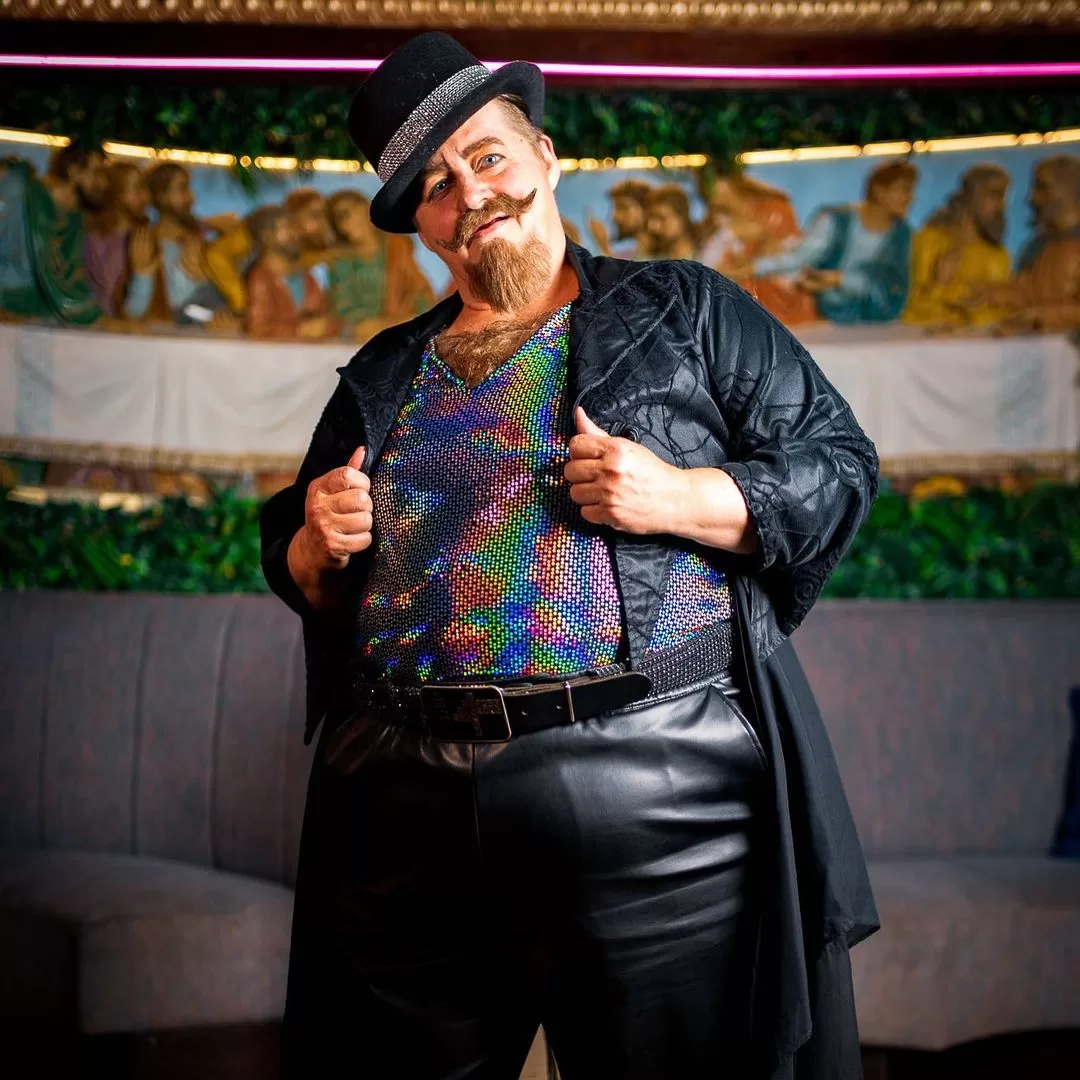
Kenny said, “My drag identity is somewhat different from the younger generation, more ‘old’s cool’ and male impersonation. If Liberace, Gomez Adams and Peter Griffin could have a baby, it would be Kenny Todgers.”
Kenny’s first exposure to drag was also in the 1980’s. At that point, he was familiar with ‘crossdressers’ and he “was dragged (pun intended) into male impersonation” himself, but the first time he remembers recognising drag as drag was when he first saw Divine perform the songs ‘Shoot your Shot’ and ‘Walk like a Man’. Kenny said, “She showed me it was more than dressing up on stage”.
Slick O’ (he/him) and Sade O’Sapphic (she/her) are a brother-sister duo performed by the incredible Shani (she/her). Slick O’ describes himself as, “a bit of a sleaze, but charming, very cheeky and funny”.
He said, “The fun of drag for me is the opportunity to parade characteristics that are not socially accepted, a satiric presentation of cliches, and exaggerating traits you would otherwise dull. You can be political, silly, sexy – your imagination is the limit.”
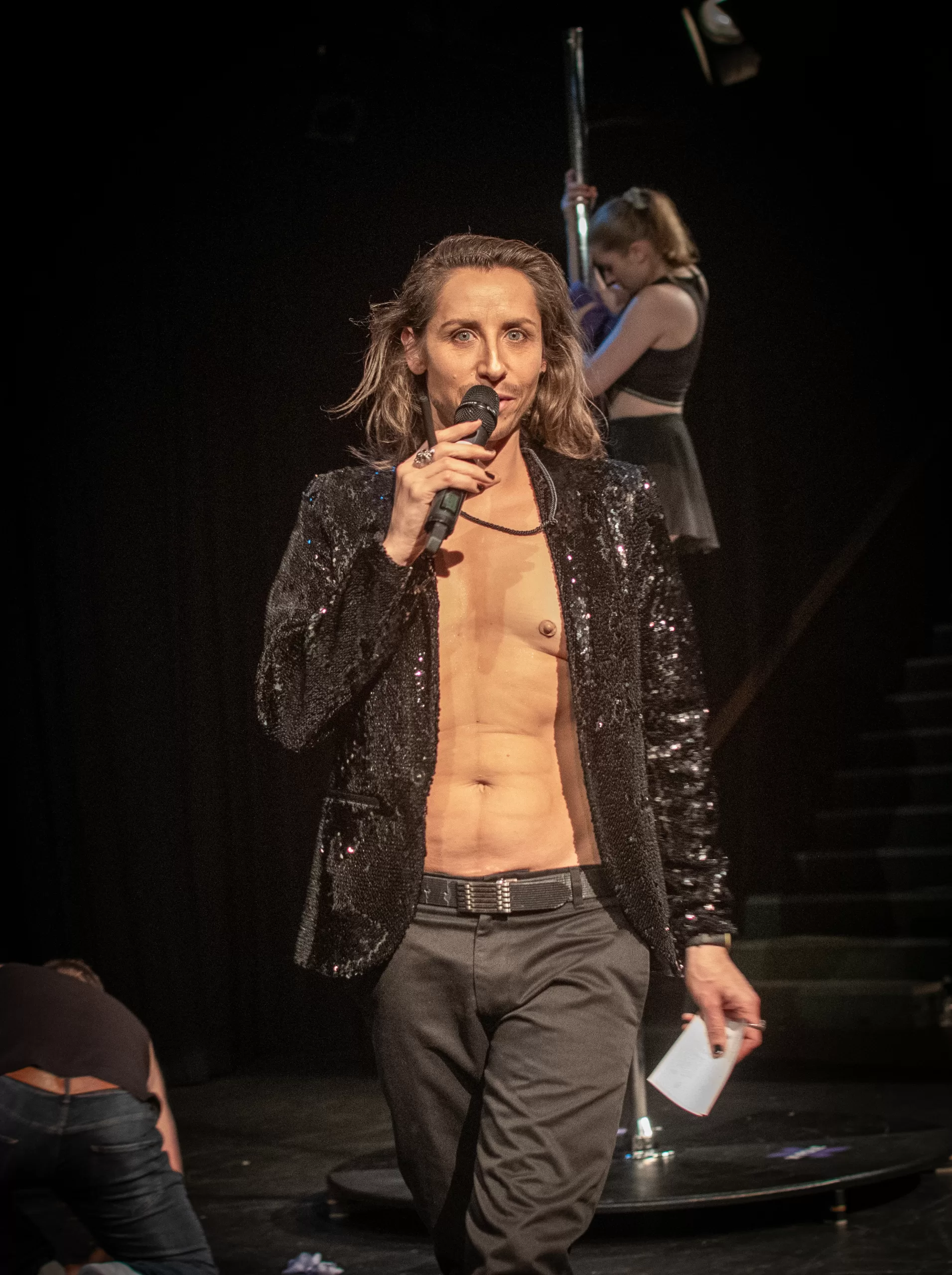
For Slick O’, his first introduction to drag came during his late teens on the gay club scene on Oxford Street in Sydney. Slick O’ doesn’t recall seeing any kings back then, but he remembers seeing Priscilla Queen of the Desert around that time.
He said, “My first encounter with kings was the Shamcocks (Ireland’s first drag king troupe) and the Windy City Blenders from Chicago in 2004.”
After first performing a burlesque cis queen act with them in the Sugar Club, Slick O’ caught the queer performance bug.
He said, “I knew I had to be a drag king, and Slick O’ and Sade O’Sapphic (burlesque) were born. This year Slick O’ is celebrating his 20-year anniversary, and he said, “I am still pleasantly surprised by the reaction he elicits. It’s empowering and freeing.”
For each of these kings, the thrill of performing on stage is unbelievably fulfilling.
Victor Victoria said, “Apart from getting dressed up, which is great fun altogether, when you don the clothes and put on a new persona, my favourite thing is being transported while you’re performing on stage. You bring the audience into your world for a few minutes. Whether you’re taking the piss or completely embodying, you get to step into a new world and bring the audience into that journey.”
Kenny added, “I love bringing that positive entertainment (or “mantertainment”) to an audience. Confusing them, making them wonder. Showing that gender is not standard to be, you can be anything you want, but do it with a smile.”
Victor Victoria loves the ability to “pick up on nuances of the toxic nature of some types of masculinity,” and use satirical versions of those elements while also maintaining “the suaveness and charming seductiveness of it”.
They added, “When I have a song I’m performing on stage, I look at every line of the song and I try to pump up the masculinity even more, and dig deeper into those meanings. In a drag sense, I turn the words on themselves, and sing it in a different way.”
For Slick O’, it’s the buzz of being on stage and getting an audience reaction that motivates him the most. He said, “I often perform as my female character first and then get changed into Slick O’. The shock factor is fun, and I enjoy showing fluidity between genders and challenging preconceived gender confines. The power play that comes with the satirical representation of masculinity.”
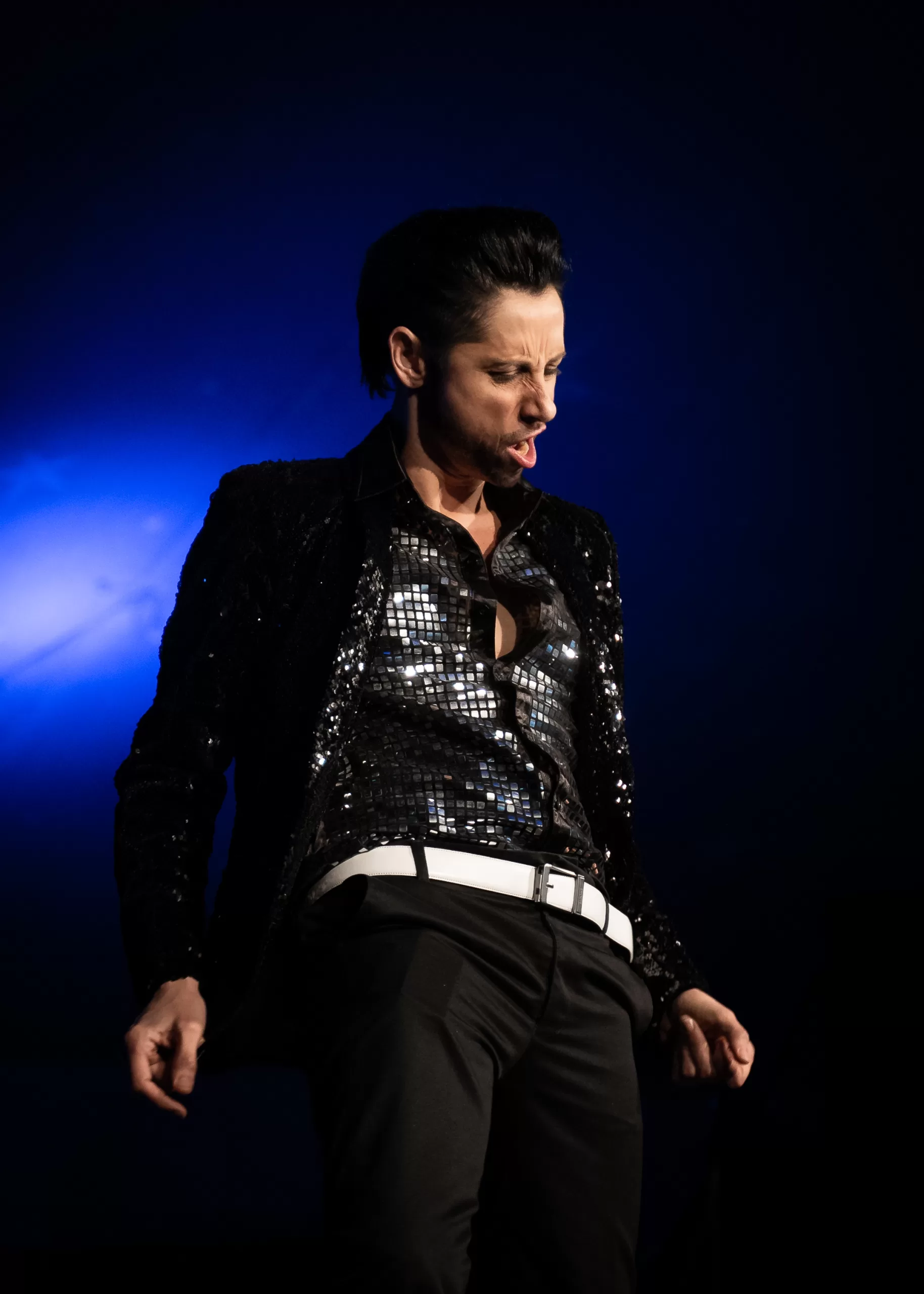
Finally, we talked about the public perception of drag kings. Kings rarely get the same exposure as queens, but this is not due to a lack of perceived legitimacy as much as the general public not even knowing that drag kings exist.
Kenny often has to explain kingship to people. He said, “Common sense would dictate that if there are queens, there must be a counterpart…kings,” but this is rarely the case.
Slick O’ agrees, sharing, “I still meet people today that don’t know what a drag king is. Explaining, ‘You know how men dress as women, as drag queens, well…’ sometimes they still don’t make the leap, I’m forced to finish the sentence.”
Victor Victoria adds, “People are shocked to think that women would dress as men for the purpose of entertainment. They probably just think less of us all together, but that’s because they haven’t come to a show or even seen AFAB people in drag attire.”
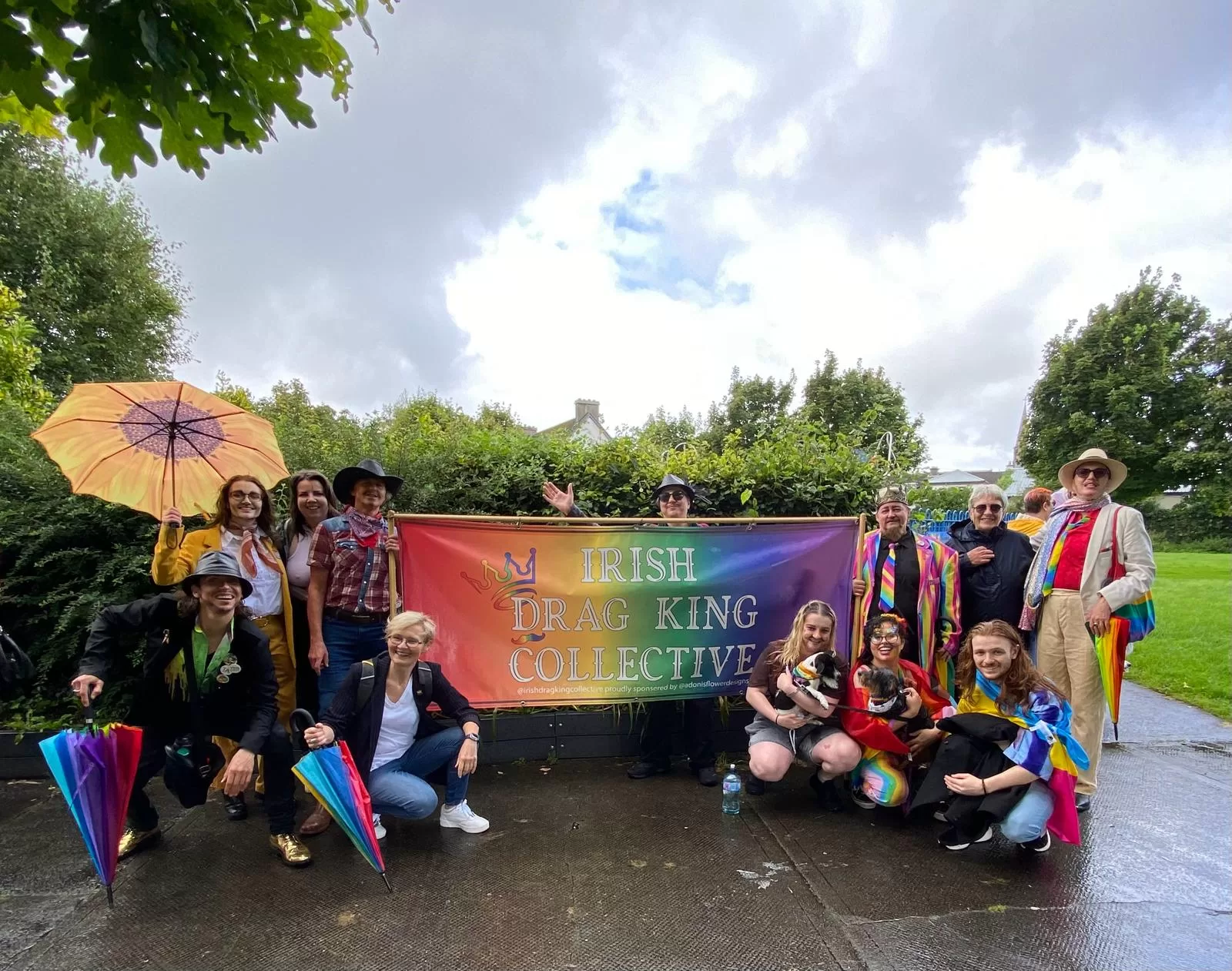
Drag queens tend to rule the scene, while cis women, trans men, non-binary, and genderqueer performers are generally less visible. Victor Victoria largely attributes this to patriarchy, “Even in the queer world, cis men often dominate queer culture.”
Slick O’ agreed, “I believe it plays into the same gender inequality that we see in all industries,” adding, “People don’t grant the same regard and recognition to drag kings. Yet!”
Kenny continued, “I’m blessed enough to work with some wonderful queens, show producers and Pride organisers who have given me a chance and booked me to be truly inclusive towards the LGBTQ+ community and general audiences.
And I am deeply appreciative to them and proud to be part of their family. But drag kings are still not as standard, included or mainstream as queens are.”
Kenny added that he has often felt overshadowed when standing among queens. Sometimes after a show, fans will ask to take photos with the queens, “while I’m being totally ignored as a ‘man’.”
Despite spending the same amount of time and money on makeup, outfits, presentation and effort as a queen does, people “…often don’t even realise that the man beside them is actually a woman because they’ve never heard of a king, or understand what they are. You become invisible.”
Victor Victoria said that while part of him wants to change this, he also loves that drag king shows exist in their own niche world with shows that regularly sell out without being formally advertised. He said, “It creates a safe space. Usually, only two-three men come to our shows, and it feels special to be out of the public eye and exist with our own audience in our own art form.”
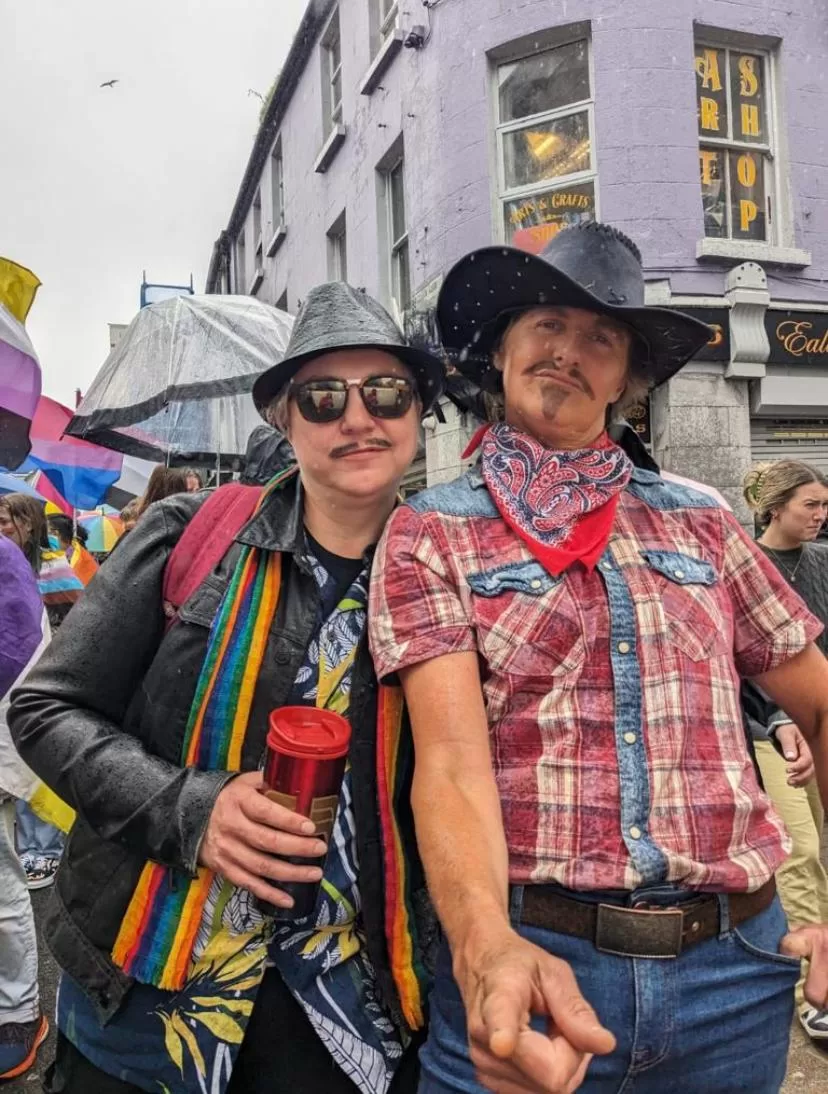
Slick O’ has noticed significant changes when it comes to the perception of younger generations- “It’s incredible to see drag kings coming out of the woodwork and the fluid gender play accepted now.” He pointed to some amazing people who are at the forefront of change, like drag king royalty Mo B Dick who created the dragkinghistory.com site.
“We need clubs and promoters to ensure that kings get equal opportunities in shows. Hard-working kings with expertise in routines, make-up, and costumes are needed for these opportunities. But without a platform to perform and represent themselves, how can kings find recognition?”
Kenny knows it would help if more queens, event organisers, and producers made a conscious effort to include more kings on their entertainment schedules. He also emphasised how word choices matter in our general discussions around drag. For example, he said, “Don’t call it Drag Queen Story Time, call it Drag Story Time”.
In November 2023, Pandora Nox became the first cis woman to win Drag Race, taking home the crown for the German version of the franchise. She celebrated her win in drag king attire, but despite 15 years of Drag Race competitions, Nox was only the second-ever contestant to perform as a king on the mainstage.
View this post on Instagram
While the multi-million dollar franchise strives to celebrate diversity, focusing on only one type of drag contributes to the perception that drag means queen. Thankfully, new performers are coming onto the scene, creating their own platforms, and taking up space in areas that have historically been dominated by cis men.
Slick O’ pointed to trailblazing artists who are elevating the presence of drag kings in the public eye, like Murray Hill, Landon Cider (US), Hugo Grrrl (NZ), Adam All (UK), Sexy Galexy (Aus), and of course our own Phil T Gorgeous being the first king to have a weekly resident show in The George.
As for Victor Victoria, he simply plans to “carry on doing my drag king thing and do my best to give it a bit more visibility and recognition.” He added, “I personally don’t feel the need to compete with what drag queens are doing. I’m very happy with the audiences we generate ourselves.”
Make sure to follow these fine performers on their Instagram pages. Long live the kings!
Victor Victoria @victorvictoriadragking, Slick ‘O’ @slicksade_, and Kenny Todgers @kenny.todgers_dragking.
This story originally appeared in GCN’s February 2024 issue 382. Read the full issue here.
© 2024 GCN (Gay Community News). All rights reserved.
This article was published in the print edition Issue No. 382 (February 1, 2024). Click here to read it now.
Support GCN
GCN is a free, vital resource for Ireland’s LGBTQ+ community since 1988.
GCN is a trading name of National LGBT Federation CLG, a registered charity - Charity Number: 20034580.
GCN relies on the generous support of the community and allies to sustain the crucial work that we do. Producing GCN is costly, and, in an industry which has been hugely impacted by rising costs, we need your support to help sustain and grow this vital resource.
Supporting GCN for as little as €1.99 per month will help us continue our work as Ireland’s free, independent LGBTQ+ media.
